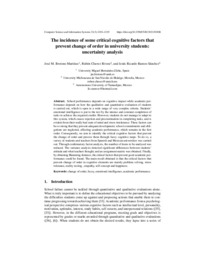Please use this identifier to cite or link to this item:
https://hdl.handle.net/11000/33279Full metadata record
| DC Field | Value | Language |
|---|---|---|
| dc.contributor.author | Brotons, Jose M | - |
| dc.contributor.author | Chavez Rivera, Ruben | - |
| dc.contributor.author | Ramos Sánchez, Jesús Ricardo | - |
| dc.contributor.other | Departamentos de la UMH::Estudios Económicos y Financieros | es_ES |
| dc.date.accessioned | 2024-09-23T12:53:38Z | - |
| dc.date.available | 2024-09-23T12:53:38Z | - |
| dc.date.created | 2024 | - |
| dc.identifier.citation | Computer Science and Information Systems 2024 Volume 21, Issue 3, Pages: 1203-1219 | es_ES |
| dc.identifier.issn | 2683-3867 | - |
| dc.identifier.uri | https://hdl.handle.net/11000/33279 | - |
| dc.description.abstract | School performance depends on cognitive impact while academic performance depends on how the qualitative and quantitative evaluation of students is carried out, which is open to a wide range of very complex criteria. Students’ emotional intelligence is put to the test by the intense and constant completion of tasks to achieve the required credits. However, students do not manage to adapt to this system, which causes rejection and procrastination in completing tasks, and is evident from their really bad state of mind and stress intolerance. These factors can be so strong that they prevent adequate development; school commitments and obligations are neglected, affecting academic performance, which remains in the first order. Consequently, we aim to identify the critical cognitive factors that prevent the change of order and process them through fuzzy cognitive maps. To do so, a survey of students and teachers from Spanish and Mexican universities was carried out. Through confirmatory factor analysis, the number of items to be analysed was reduced. The variance analysis detected significant differences between students’ attitude and what teachers thought, and an assignment matrix was obtained. Finally, by obtaining Hamming distance, the critical factors that prevent good academic performance could be found. The main result obtained is that the critical factors that prevent change of order in cognitive elements are mainly problem solving, stress tolerance, reality testing , empathy, self-concept and happiness. | es_ES |
| dc.format | application/pdf | es_ES |
| dc.format.extent | 18 | es_ES |
| dc.language.iso | eng | es_ES |
| dc.publisher | National Library of Serbia | es_ES |
| dc.rights | info:eu-repo/semantics/openAccess | es_ES |
| dc.rights | Attribution-NonCommercial-NoDerivatives 4.0 Internacional | * |
| dc.rights.uri | http://creativecommons.org/licenses/by-nc-nd/4.0/ | * |
| dc.subject | change of order | es_ES |
| dc.subject | fuzzy | es_ES |
| dc.subject | emotional intelligence | es_ES |
| dc.subject | academic performance | es_ES |
| dc.subject.other | CDU::3 - Ciencias sociales::33 - Economía | es_ES |
| dc.title | The incidence of some critical cognitive factors that prevent change of order in university students: uncertainty analysis | es_ES |
| dc.type | info:eu-repo/semantics/article | es_ES |
| dc.relation.publisherversion | https://doi.org/10.2298/CSIS230213030B | es_ES |

View/Open:
2024 ComSIS_15644.pdf
263,24 kB
Adobe PDF
Share:
.png)
